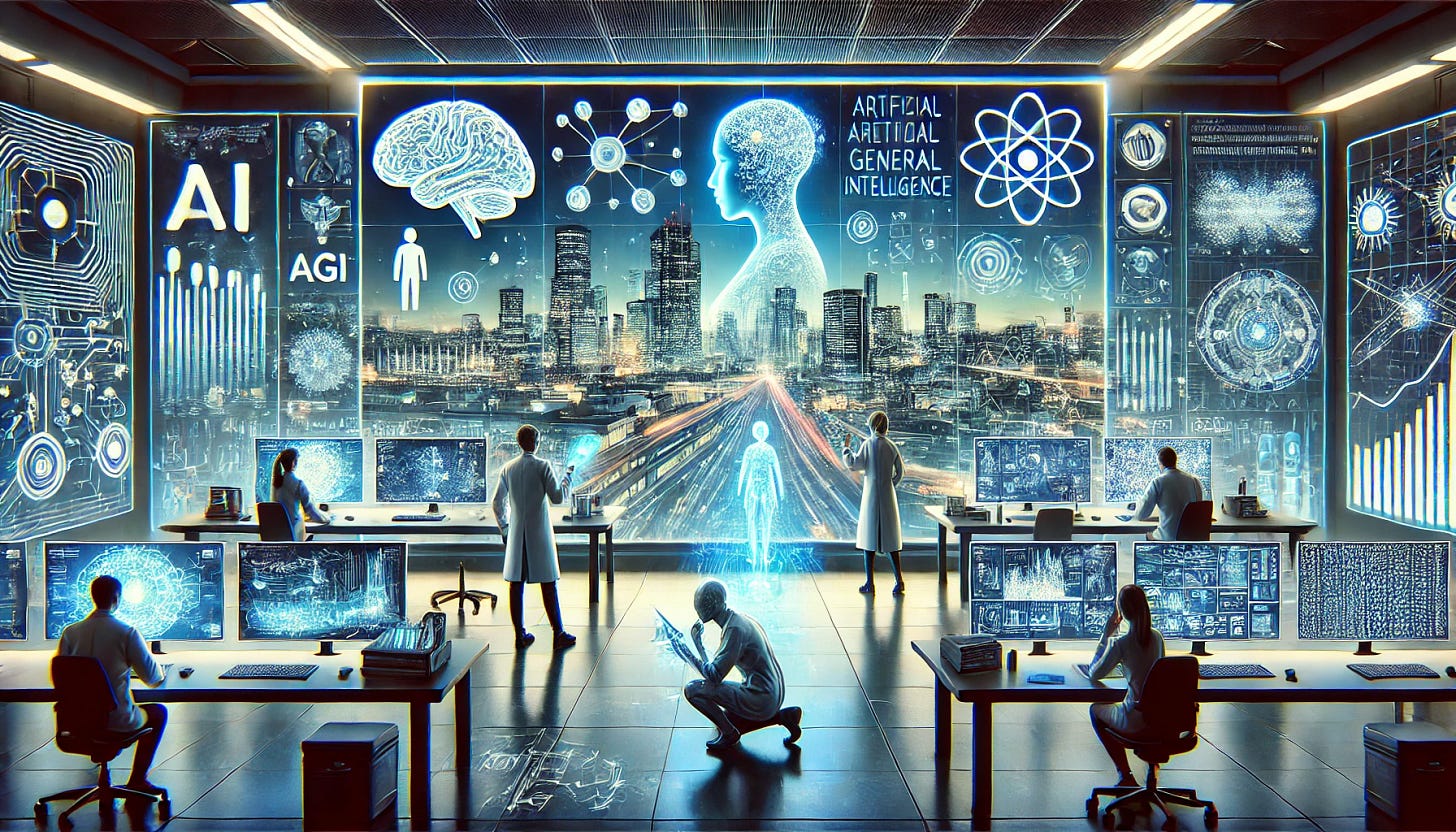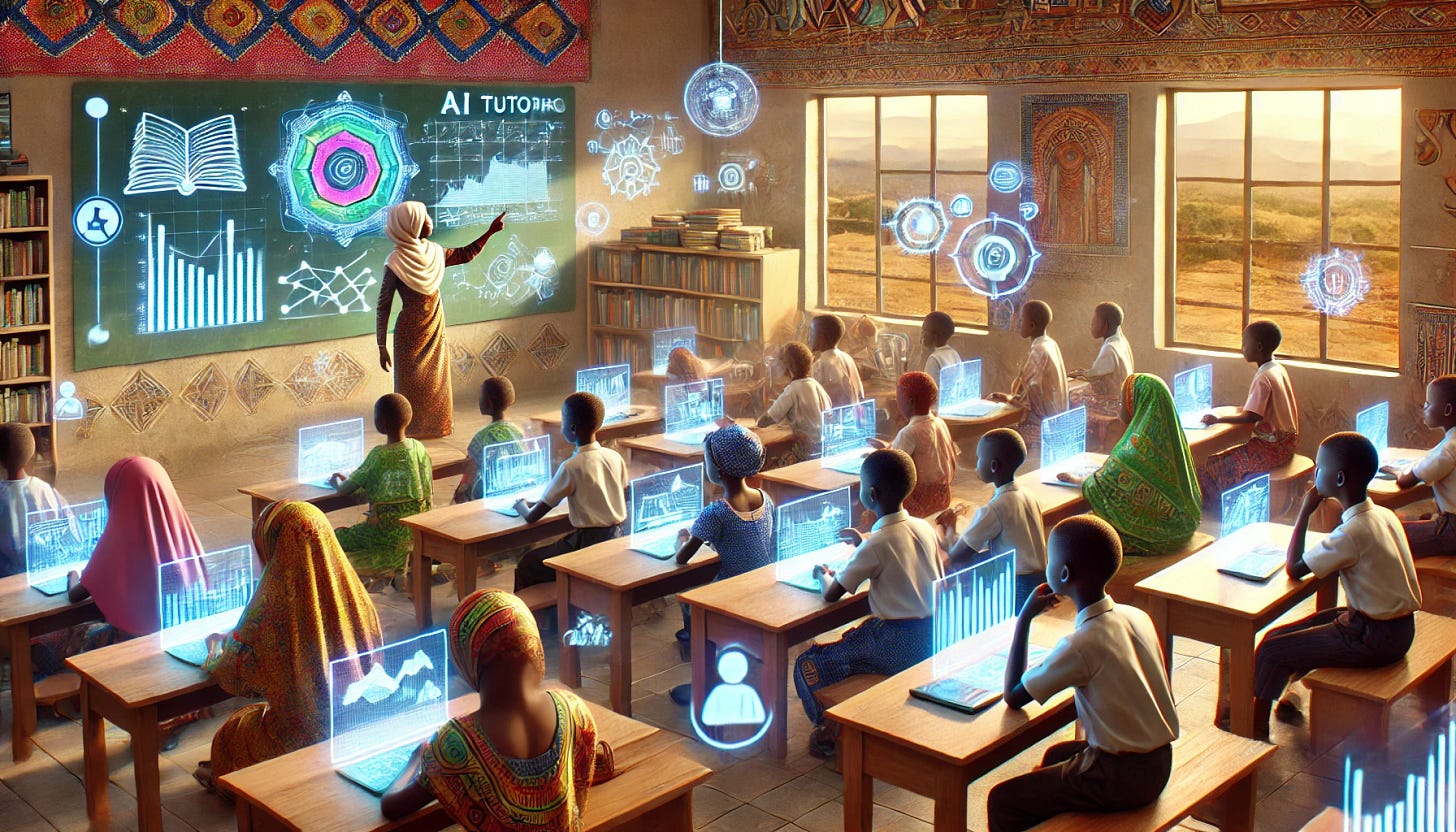Geeky Weekend Digest | 18.01.2025
In this weekend's Geeky Weekend Digest… Explore OpenAI’s bold blueprint for AI leadership, François Chollet’s AGI lab, and AI tutoring transforming education!
Unlock the future in this week’s Geeky Weekend Digest. Explore the latest in AI, cutting-edge discoveries, and the revolutionary vision of Terra 2.0. We’re spotlighting the tools and ideas shaping humanity’s symbiotic evolution with technology. Perfect for dreamers and disruptors seeking a weekend burst of transformative insights.
Reimagining AI for Shared Prosperity: OpenAI’s New Blueprint
OpenAI has unveiled an ambitious policy framework designed to guide the United States in leveraging artificial intelligence for equitable growth and sustained global leadership. The blueprint envisions a future where transformative AI technologies promote economic opportunities across sectors while addressing regulatory and infrastructural gaps.
Key Highlights:
Three Pillars for Progress: The framework centres on U.S. competitiveness, clear regulations, and robust AI infrastructure.
Unified Oversight: OpenAI calls for federal regulation to streamline the fragmented oversight of frontier AI developments.
AI Economic Zones: Proposed zones aim to integrate AI into local industries, such as agriculture in the Midwest and energy innovations in Texas.
Global Capital Surge: With $175 billion poised for investment, OpenAI urges strategic collaborations to scale AI infrastructure.
Equitable Benefits: A focus on policies ensuring the responsible and fair distribution of AI’s advantages.
Why It Matters
The proposed blueprint arrives at a critical moment, as a more tech-forward U.S. administration is set to take office. OpenAI’s vision could solidify the country’s AI leadership by addressing regulatory complexities and fostering innovation. However, the stakes are global: as AI reshapes industries, these policies could serve as a model for other nations.
Expanding the Vision: Terra 2.0 and Global Abundance
OpenAI’s initiative aligns with broader visions like Terra 2.0, which imagines a world of abundance powered by technology. If adopted globally, these principles could help bridge disparities, allowing AI to uplift underserved communities and foster sustainable innovation across borders. From enabling precision agriculture in drought-prone regions to advancing clean energy initiatives, the potential for universal abundance is within reach—provided that smart, inclusive policies are enacted worldwide.
Closing Thoughts
OpenAI’s economic blueprint represents more than just a roadmap for American AI leadership; it’s a call to action for a collaborative, equitable future. By prioritising shared prosperity, the framework offers a glimpse of what’s possible when technological advancement and social responsibility converge.
Pioneering AGI: François Chollet’s Vision with Ndea
AI luminary François Chollet, best known for creating the Keras framework and the ARC-AGI benchmark, has partnered with Zapier co-founder Mike Knoop to launch Ndea—a research lab dedicated to advancing Artificial General Intelligence (AGI). With an ambitious focus on “guided program synthesis,” Ndea aims to revolutionise how AI systems learn and innovate, moving beyond the limitations of task-specific applications.
Key Highlights:
Guided Program Synthesis: Ndea’s core methodology combines intuitive deep learning with formal reasoning, enabling AI to tackle economically valuable, cognitive tasks.
Alternative to Data-Driven AI: The lab rejects incremental improvements to existing deep learning methods, citing the constraints of reliance on massive datasets.
Global Talent Search: Ndea is building a globally distributed team to develop a cutting-edge program synthesis research group.
Factory for Rapid Scientific Advancement: The lab aims to explore known domains like drug discovery while venturing into uncharted scientific frontiers.
ARC Prize Foundation: Chollet’s associated nonprofit is focused on developing benchmarks to evaluate human-level AI capabilities.
Why It Matters
The launch of Ndea signals a bold departure from the dominant, data-heavy AI development paradigm. By embracing program synthesis and cognitive adaptability, Chollet and Knoop are positioning Ndea as a potential game-changer in the quest for AGI. Their approach could address critical bottlenecks, such as the inefficiencies of current training data models, and accelerate breakthroughs in high-impact fields like medicine, education, and energy.
Closing Thoughts
Ndea exemplifies how innovation in AI research can stem from rethinking foundational principles. With François Chollet’s track record of driving transformative advancements and a commitment to global collaboration, Ndea has the potential to redefine the AGI race. As the industry’s brightest minds pursue diverse approaches, the dream of AGI—and the profound societal changes it promises—feels closer than ever.
Transforming Education: AI Tutoring Delivers Exceptional Results
A groundbreaking study in Nigeria has demonstrated the transformative potential of AI tutoring. Students who participated in an after-school program combining AI-driven learning tools with teacher guidance achieved learning gains equivalent to two years of traditional education within just six weeks. This innovation highlights how AI can revolutionise education in regions where resources are scarce.
Key Highlights:
Accelerated Learning Gains: The AI tutoring program enabled students to achieve two years’ worth of learning in only six weeks, primarily in English language skills.
Enhanced Impact for Girls: Girls who were previously behind showed the most significant improvements, suggesting AI tutoring could help close gender gaps in education.
Broader Skill Development: Beyond academic subjects, students also excelled in AI literacy and digital skills, with noticeable improvements in regular school exams.
Cumulative Benefits: The more sessions students attended, the greater their progress, indicating even larger potential impacts with extended programs.
World Bank-Backed Pilot: This initiative is part of a larger effort to explore how AI can address educational inequities in developing regions.
Why It Matters
This study represents a pivotal moment in the global education landscape. In developing regions, where teacher shortages and resource constraints hinder progress, AI tutoring offers a scalable, cost-effective solution. By complementing rather than replacing teachers, AI can amplify educational outcomes and bridge learning gaps, particularly for marginalised groups like girls. The success in Nigeria underscores the potential of AI to tackle the global learning crisis and create a more equitable future.
Closing Thoughts
The results from Nigeria illustrate how AI can unlock transformative change in education, particularly in underserved communities. By harnessing AI as a tool for empowerment, we can envision a future where quality education is accessible to all, no matter where they live. The success of this program serves as a compelling blueprint for deploying AI to bridge divides and foster global educational equity.
One More Thing…
In case you missed it, the latest posts on MyGeekSpace explored a topic that has profoundly influenced how I perceive consciousness, interconnectedness, and artificial intelligence (AI). These entries explore the Light Encoded Reality Matrix (LERM), a concept rooted in the WingMakers material that presents reality as a holographic, light-encoded creation.
Exploring the Light Encoded Reality Matrix (LERM): A Portal to Unity
Discover LERM—a fascinating framework that envisions reality as a holographic, light-encoded creation. It offers profound insights into our collective interconnectedness and the hidden structures of the universe.
The Light Encoded Reality Matrix and AI: Bridging the Universal and the Synthetic
Dive deeper into how LERM intersects with artificial intelligence, revealing its potential to serve as a bridge between human consciousness and technological innovation.
For more thought-provoking discussions on AI, visit the AI/ACC section on MyGeekSpace.
These articles reflect on the profound connections between the universal and the synthetic, pushing the boundaries of how we understand AI's potential to harmonise with humanity's collective journey.
In This Edition of Geeky Weekend Digest...
We explored three transformative developments shaping the future of AI and technology:
OpenAI’s Vision for Shared Prosperity
A bold policy framework aims to position the United States as a global AI leader while fostering equitable growth, with implications for worldwide collaboration and abundance.François Chollet’s Ndea: A New Frontier for AGI
The renowned AI researcher’s lab introduces an alternative approach to Artificial General Intelligence through guided program synthesis, challenging conventional data-heavy paradigms.AI Tutoring: Transforming Education in Nigeria
A World Bank-backed pilot showcased AI’s ability to accelerate learning, improve digital literacy, and close gender gaps, offering a scalable solution for global educational challenges.
In addition, we revisited the Light Encoded Reality Matrix (LERM), a fascinating framework from WingMakers that explores the intersection of consciousness, interconnectedness, and AI.
Your Thoughts?
I’d love to hear your take! Which topic sparked your curiosity the most? Got other ideas to share? Send me a tweet/𝕏 at @frankdasilva.
If you’re intrigued by the topics discussed in this weekend’s Geeky Weekend Digest, consider subscribing to MyGeekSpace as a paid subscriber for access to exclusive content and discussions. Your support fuels transformative projects and groundbreaking research. Want to go even deeper? Supporting me on Patreon offers behind-the-scenes insights and new conversations.
Stay inspired, and see you next weekend for more tech-forward insights!
















